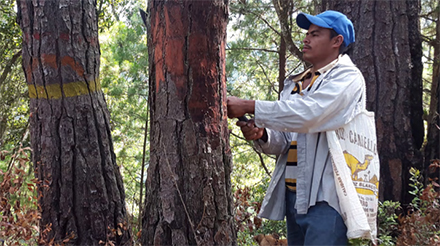Governments seeking to develop national timber traceability systems to comply with tightening international standards can look for inspiration to Latin America, a joint report by the FAO-EU Forest Law Enforcement, Governance and Trade (FLEGT) Program and the World Resources Institute (WRI) has found. Source: Timberbiz
The report, Timber traceability: A management tool for governments. Case studies from Latin America draws from experiences in Brazil, Colombia, Ecuador, Guatemala, Honduras, Panama and Peru, and offers a range of best practices and recommendations for planning and implementing government-led timber traceability systems, which enable countries to track the flow of timber from a legal place of harvest through transformation along the value chain, to the point of sale.
“Latin America has very innovative timber traceability systems adapted to different legal frameworks and institutional architectures,” said FAO Forestry Officer Guillermo Navarro.
“Countries across the rest of the world can learn from Latin America experiences as they design and implement their own timber traceability systems, which – by meeting national and international demand for legally verified timber – can boost local, regional and national economies, while helping to address deforestation, forest degradation and the illegal logging and associated trade.”
Ruth Nogueron, Senior Associate with the World Resources Institute, said: “This report provides invaluable insight into timber traceability, which is vital for understanding the origin of wood products. Our ability to track the flow of timber reveals important details about production processes, and allows us to better assess the legal, social and environmental claims associated with specific products.”
Illegality and corruption in the timber sector degrades forests, undermines countries’ efforts to manage them sustainably, and contributes to biodiversity loss and threatens livelihoods, while halting progress towards many of the Sustainable Development Goals.
While the full extent of illegal logging is difficult to gauge, the International Criminal Police Organization (INTERPOL) estimates that its value lies in the range of USD $51–$152 billion per year globally.
There are growing demands for tropical timber-producing countries to develop national timber traceability systems. These demands include legislation in importer countries, such as the United States Lacey Act, the European Union
Timber Regulation, the Australian Illegal Logging Act, and similar legislation for Japan, Viet Nam, Switzerland, Korea, Malaysia, Indonesia, China and New Zealand requiring timber importers to prove the legality of their timber purchases, which represent altogether more than 85% of the global legal timber demand.
This will have an important impact for improving sustainable and legal management of natural resources in producing countries.
The report stresses that a high level of political will and support, a solid legal and regulatory framework, and enough financial support, including from national governments and international organizations, are among the key ingredients for the successful implementation of traceability systems.
Examples of good practice highlighted in the report include stakeholder buy-in in Guatemala, where forest authorities consulted extensively in the early stages of implementation of the country’s new traceability system and adapted it accordingly.
In Brazil, civil society organizations played an important and complementary role, taking government timber traceability information and make it available online to international buyers to help them assess the legal origin of the timber they purchase. In doing so, these organizations facilitate the trade of legal forest products and boost livelihoods for those in the forest sector.
Developing and rolling out timber traceability systems can be challenging, as timber supply chains are complex and fragmented and are often under the oversight of a number of different government agencies.
Further, the changes in operations management and logistics brought through these systems can require significant financial and labour investments by the private sector. As such, system implementers often face resistance from stakeholders, particularly when there is a need to address capacity gaps.
You can download the report Timber Traceability Latin America.








